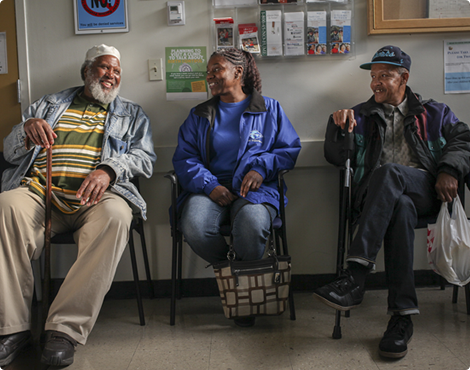The TCN model was developed in collaboration with community-based organizations and community members impacted by incarceration to address health inequities and transform health systems. This model developed out of deep listening and shared problem-solving and is grounded in wisdom from the community. Central to the TCN model are community health workers (CHWs) with lived experience of incarceration. TCN hires and trains CHWs to integrate into the primary care system, engaging and supporting patients returning from incarceration and serving as liaisons to navigate health and social services. The shared history between CHWs and patients helps build a trusting and engaging relationship, which leads to better health outcomes for patients. The TCN model is an evidence-based primary care system intervention that improves health and reentry outcomes.
TCN partners with existing primary care programs in to implement the TCN model. The first TCN program launched in 2006 at the San Francisco Department of Public Health’s Southeast Health Center, a full-service clinic providing affordable, comprehensive, quality care in Bayview-Hunters Point, a low-income community of color disproportionately harmed by mass incarceration. TCN has successfully onboarded 48 community-based primary care programs to the TCN model in 14 states and Puerto Rico, including 21 programs in California. TCN programs employ over 100 CHWs with lived experience of incarceration and have served over 20,000 returning community members.
Each program in the TCN network has implemented the TCN model. TCN programs provides a patient-centered primary care medical home for chronically-ill returning community members. Each program is based within safety-net community health centers in neighborhoods most impacted by incarceration, and provides:
- Community health workers with a history of incarceration as part of an integrated medical team
- Linkages with correctional partners to provide continuity of care
- Easy access to comprehensive primary care
- Culturally competent, patient-centered medical services
- Close partnerships with local reentry and social services organizations to address social determinants of health
Find a TCN Program in your area: LOCATIONS

